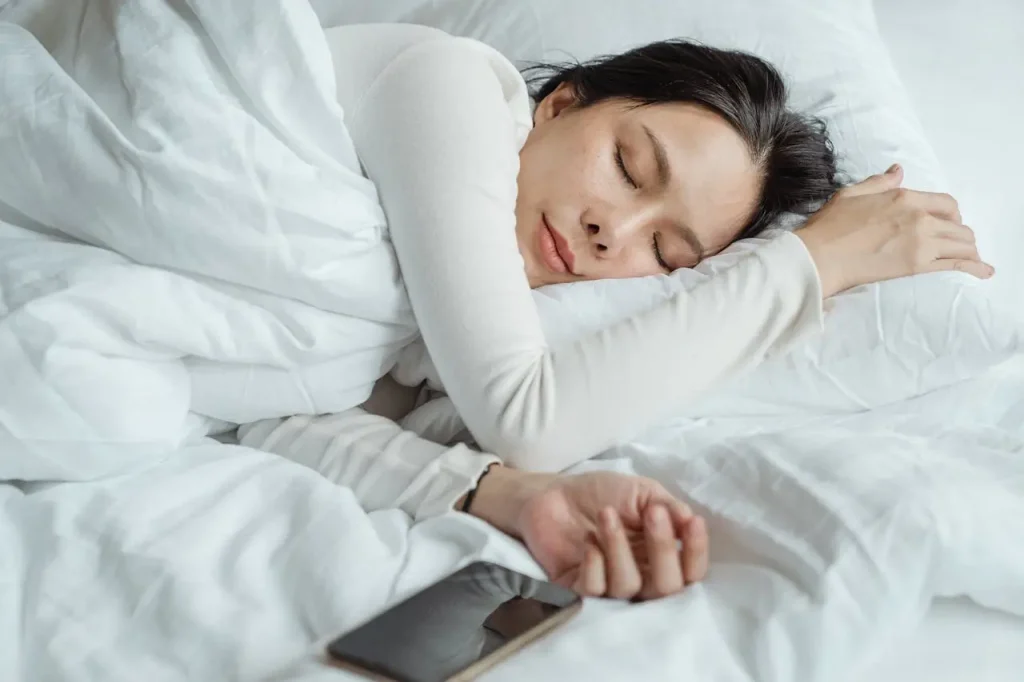Sleep Soundly: How Limiting Screen Time Boosts Your Bedtime Routine

In today’s digital age, it’s no surprise that we are spending more and more time glued to our screens. Whether it’s scrolling through social media, binge-watching our favorite shows, or working late hours on our laptops, our screen time seems to be ever-increasing. But did you know that all this screen time can have a negative impact on our bedtime routine and quality of sleep?
In this article, we will explore how limiting screen time can greatly improve your sleep and overall well-being. We’ll dive into the science behind the effects of screen exposure on your brain and body, and provide practical tips on how to reduce screen time before bed. From setting screen-free zones in your home to utilizing blue light filters on your devices, you’ll discover simple and effective strategies to enhance your sleep routine.
So, if you find yourself tossing and turning at night or struggling to fall asleep, it’s time to take control of your screen time. Get ready to explore the benefits of a screen-free bedtime routine and reclaim a restful night’s sleep.
The Impact of Screen Time on Sleep Quality
Sleep is essential for our overall health and well-being. It allows our bodies and minds to rest, recover, and rejuvenate. However, excessive screen time can disrupt our sleep patterns and negatively impact the quality of our sleep. Various studies have linked increased screen time to sleep problems, such as difficulty falling asleep, shorter sleep duration, and poor sleep quality.
The blue light emitted by electronic devices, such as smartphones, tablets, and computers, suppresses the production of melatonin, a hormone that regulates our sleep-wake cycle. Exposure to blue light in the evening can trick our brains into thinking it’s still daytime, making it harder to fall asleep and stay asleep throughout the night. Additionally, the stimulating content we consume on screens can keep our minds active and make it difficult to unwind before bed.
To improve your sleep quality, it’s crucial to limit your screen time before bed. By doing so, you can minimize the negative impact of screens on your sleep-wake cycle and promote a more restful night’s sleep.
The Importance of a Bedtime Routine for Better Sleep
Establishing a bedtime routine is essential for promoting healthy sleep habits. A consistent routine signals to your body that it’s time to wind down and prepare for sleep. It helps regulate your internal clock and promotes relaxation, making it easier to fall asleep and maintain a deep and restorative sleep throughout the night.
A well-designed bedtime routine should include activities that promote relaxation and disengagement from the day’s stressors. However, using screens before bed can disrupt this process. The stimulating content and blue light exposure can keep your mind alert and delay the onset of sleep. By limiting screen time and incorporating alternative activities into your bedtime routine, you can optimize your sleep and wake up feeling refreshed and rejuvenated.
Let’s explore some practical tips to reduce screen time before bed and create a relaxing bedtime routine that sets the stage for a restful night’s sleep.
The Role of Melatonin in Regulating Sleep
Before we dive into the detrimental effects of screen time on melatonin production, let’s understand the role of melatonin in regulating our sleep-wake cycle. Melatonin is a hormone produced by the pineal gland in the brain. It plays a crucial role in regulating our sleep and wakefulness.
Melatonin is often referred to as the “sleep hormone” because its levels rise in the evening in response to darkness, signaling to our bodies that it’s time to sleep. It helps synchronize our internal body clock with the natural light-dark cycle, promoting healthy sleep patterns. However, exposure to blue light from screens can disrupt melatonin production, leading to difficulties falling asleep and maintaining a consistent sleep schedule.
Understanding the relationship between screen time and melatonin production is essential for effectively managing your bedtime routine and optimizing your sleep quality.
How Screen Time Disrupts the Production of Melatonin
The blue light emitted by screens, such as smartphones, tablets, and computers, can significantly impact the production of melatonin. When exposed to blue light in the evening, our brains interpret it as daylight, suppressing the release of melatonin and signaling wakefulness instead of promoting sleep.
Furthermore, the closer we hold the screens to our faces, the more intense the blue light exposure becomes. This intensifies the disruption to our melatonin production and further disrupts our sleep-wake cycle. The constant exposure to screens before bed can lead to delayed sleep onset, decreased total sleep time, and decreased sleep quality.
To counteract the negative effects of screen time on melatonin production, it’s crucial to limit screen exposure before bed and adopt alternative activities that promote relaxation and prepare your body for sleep.
Tips for Limiting Screen Time Before Bed
Reducing screen time before bed may seem challenging, especially with the prevalence of digital devices in our daily lives. However, with a few simple strategies, you can successfully limit your screen time and create a screen-free environment conducive to better sleep. Here are some tips to get you started:
- Set Screen-Free Zones in Your Home: Designate certain areas in your home, such as the bedroom, as screen-free zones. This creates a physical boundary between screens and sleep, reducing the temptation to use devices before bed.
- Establish a Digital Detox Time: Set a specific time each evening when you will disconnect from screens. This could be an hour before bed or longer, depending on your preference. Use this time to engage in relaxing activities that promote sleep, such as reading, journaling, or practicing mindfulness.
- Utilize Blue Light Filters: Many devices now come with built-in blue light filters or night mode settings that reduce the amount of blue light emitted. Enable these features on your devices to minimize the impact of blue light on your sleep.
- Avoid Screen Time as a Wind-Down Activity: Instead of using screens as a way to unwind before bed, incorporate other calming activities into your bedtime routine. Consider taking a warm bath, practicing gentle stretching or yoga, listening to calming music, or meditating.
- Keep Devices Out of the Bedroom: Create a screen-free sanctuary in your bedroom by keeping electronic devices out of reach. Charge your phone outside the bedroom or in a designated area, allowing you to disconnect from screens and focus on getting quality sleep.
By implementing these tips, you can gradually reduce your screen time before bed and establish a relaxing bedtime routine that prepares your mind and body for a restful night’s sleep.
Creating a Relaxing Bedtime Routine
Now that we’ve discussed the importance of a bedtime routine and the impact of screen time on sleep quality, let’s explore how you can create a relaxing and screen-free routine that promotes better sleep.
- Establish a Consistent Sleep Schedule: Aim to go to bed and wake up at the same time every day, even on weekends. This helps regulate your body’s internal clock and improves sleep quality.
- Dim the Lights: As bedtime approaches, dim the lights in your home to signal to your body that it’s time to wind down. Consider using soft, warm lighting in your bedroom to create a calm and soothing atmosphere.
- Engage in Relaxing Activities: Replace screen time with activities that promote relaxation and prepare your mind and body for sleep. This could include reading a book, practicing gentle yoga or stretching, taking a warm bath, or listening to calming music.
- Create a Sleep-Friendly Environment: Make your bedroom a sleep-friendly haven by keeping it cool, quiet, and dark. Use blackout curtains, earplugs, or a white noise machine to block out any disruptive stimuli that may interfere with your sleep.
- Practice Mindfulness and Deep Breathing: Incorporate mindfulness and deep breathing exercises into your bedtime routine. These practices can help calm your mind, reduce stress, and promote a sense of relaxation before sleep.
By following these simple steps, you can create a relaxing bedtime routine that promotes better sleep and prepares you for a restful night ahead.
The Benefits of Reading Before Bed Instead of Using Screens
One of the most effective ways to reduce screen time before bed is to replace it with reading. Reading has numerous benefits for your sleep and overall well-being. Let’s explore some of the advantages of reading before bed:
- Reduced Stress: Reading can help you unwind and escape from the stressors of daily life. It allows your mind to focus on a different narrative and helps shift your thoughts away from work or other concerns that may keep you awake.
- Improved Sleep Quality: Reading before bed promotes relaxation and can help you fall asleep faster. It provides a screen-free alternative that doesn’t disrupt melatonin production, making it easier to maintain a consistent sleep schedule.
- Expanded Knowledge and Imagination: Reading exposes you to new ideas, perspectives, and worlds. It stimulates your imagination and creativity, providing a mental escape that can contribute to a more restful night’s sleep.
- Enhanced Cognitive Function: Regular reading has been linked to improved cognitive function, including better memory, concentration, and problem-solving skills. By making reading part of your bedtime routine, you can support your overall brain health.
So, instead of reaching for your phone or tablet before bed, grab a good book and immerse yourself in a world of words. Not only will you be reducing your screen time, but you’ll also be reaping the benefits of a more peaceful and rejuvenating sleep.
Incorporating Mindfulness and Relaxation Techniques into Your Bedtime Routine
In addition to limiting screen time and reading before bed, incorporating mindfulness and relaxation techniques into your bedtime routine can further enhance your sleep quality and overall well-being. These practices help calm your mind, reduce stress, and prepare your body for a restful night’s sleep.
Here are some mindfulness and relaxation techniques you can try:
- Progressive Muscle Relaxation: This technique involves systematically tensing and relaxing different muscle groups in your body. By focusing on each muscle group, you can release tension and promote a sense of relaxation.
- Deep Breathing Exercises: Deep breathing is a simple yet powerful technique that can help activate your body’s relaxation response. Take slow, deep breaths, focusing on your breath as it enters and leaves your body. This can help calm your mind and prepare you for sleep.
- Guided Meditation: Listen to guided meditation recordings or use meditation apps to help you relax and unwind before bed. These guided sessions can provide calming visuals and soothing instructions, allowing you to let go of any stress or tension.
- Journaling: Spend a few minutes journaling before bed to clear your mind and release any thoughts or worries that may be keeping you awake. Write down your thoughts, feelings, or anything that comes to mind. This practice can help you process your emotions and promote a sense of calm.
By incorporating these mindfulness and relaxation techniques into your bedtime routine, you can create a peaceful and soothing environment that promotes better sleep and overall well-being.
Tracking Your Screen Time and Sleep Patterns with Apps and Devices
In today’s digital age, there are numerous apps and devices available that can help you track your screen time and sleep patterns. These tools provide valuable insights into your daily habits and can help you identify areas for improvement. By monitoring your screen time and sleep patterns, you can make more informed decisions about your bedtime routine and optimize your sleep quality.
Here are some popular apps and devices that can assist you in tracking your screen time and sleep:
- Screen Time Tracking Apps: Apps like Moment, RescueTime, and Screen Time can help you monitor and limit your screen time. They provide detailed reports on your daily usage, allowing you to set goals and establish healthy screen time habits.
- Sleep Tracking Apps: Apps such as Sleep Cycle, SleepScore, and Fitbit can track your sleep patterns and provide insights into your sleep quality. They use sensors or microphone monitoring to analyze your movements and sleep stages, helping you understand your sleep habits better.
- Blue Light Filter Apps: Some apps, like Twilight and f.lux, can apply blue light filters to your devices, reducing the amount of blue light emitted. These apps can help protect your melatonin production and promote a more restful night’s sleep.
By utilizing these apps and devices, you can gain a deeper understanding of your screen time habits and sleep patterns. This knowledge can empower you to make positive changes to your bedtime routine and improve your sleep quality over time.
Conclusion: Embracing Screen-Free Evenings for a Better Night’s Sleep
In conclusion, the prevalence of screens in our daily lives has a significant impact on our sleep quality and overall well-being. Excessive screen time before bed disrupts our sleep-wake cycle by suppressing melatonin production and keeping our minds stimulated. However, by limiting screen time and implementing a screen-free bedtime routine, you can greatly improve your sleep and wake up feeling refreshed and rejuvenated.
Remember, it’s essential to establish a consistent bedtime routine that promotes relaxation and prepares your mind and body for sleep. Incorporate activities like reading, mindfulness, and deep breathing into your routine to create a calm and soothing environment. By tracking your screen time and sleep patterns with apps and devices, you can gain valuable insights and make informed decisions about your sleep habits.
So, take control of your screen time, embrace screen-free evenings, and prioritize your sleep. Your body and mind will thank you as you enjoy the benefits of a restful night’s sleep and wake up ready to conquer the day ahead.


